Corynn Sheridan & Ted Deaton - How contractors are withstanding coastal challenges - PODCAST TRANSCRIPTION
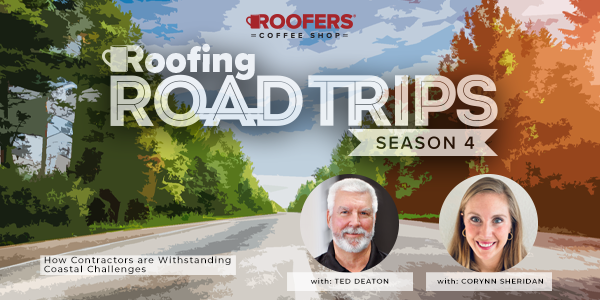
Editor's note: The following is the transcript of a live interview with Corynn Sheridan of DuPont and Ted Deaton of RPI Roofing. You can read the interview below or listen to the podcast.
Speaker 1:
Welcome to Roofing Road Trips with Heidi. Explore the roofing industry through the eyes of a long-term professional within the trade. Listen for insights, interviews, and exciting news in the roofing industry today.
Heidi Ellsworth:
Hello, and welcome to another Roofing Road Trips from RoofersCoffeeShop. This is Heidi Ellsworth, and I'm here today road-tripping across country, actually someplace I was just there. I was just in Florida, and we're heading back there virtually for a really interesting podcast today about what's happening in metal and especially with the Tedlar film and some amazing installations that have happened just recently. So I'm here today with Corynn Sheridan of DuPont and Ted Deaton of RPI Roofing. Welcome to the show.
Ted Deaton:
Good afternoon.
Corynn Sheridan:
Hi. Thanks for having us.
Heidi Ellsworth:
Ah, it's great to have you. And we have Corynn back. She's been here a couple times. And Ted, I'm just so happy to have you join us and share some of the information about the project that you did in Hilton Head with the Metal Alliance, metal tiles that have the Tedlar film. So we're going to get into all of that. I'm really excited to hear more about it, but let's start out with, can you introduce yourself, Ted, and talk to us a little bit about your company, RPI Roofing?
Ted Deaton:
I'm Ted Deaton, vice president of RPI Roofing. Our mothership location's in Richmond Hill, Georgia, outside of Savannah. We also have offices in Columbia, South Carolina, and Augusta, Georgia. We're about a $15 million roofing company that does mostly commercial and industrial work. And this, we were invited to bid on this project by a consultant we do work for, or have done work for over the years.
Heidi Ellsworth:
Great.
Ted Deaton:
I was on the manufacturing side of the business for almost 20 years and been on the contracting side now for a little over 20 years.
Heidi Ellsworth:
Wow.
Ted Deaton:
So I have a diverse knowledge from both perspectives of our industry.
Heidi Ellsworth:
Great history. To be able to take everything that's happening in the industry, to have that kind of background really pays off, to see both sides of the coin. So Corynn, before we get too far down, I'm excited to talk about this project, I would love it if you could introduce yourself and then talk to us a little bit about Tedlar from DuPont and what that is.
Corynn Sheridan:
Absolutely. So, as you mentioned, Heidi, I've been here a few times. My name's Corynn Sheridan. I'm the marketing director for DuPont Tedlar. DuPont, obviously the large global company producing materials that go into almost every aspect of life. But Tedlar has been around actually since the early '60s. It's a polyvinyl fluoride film, it's called a PVF film, that has incredible flexibility and chemical resistance. So it's very, very versatile. It's been used in a ton of applications, ranging from signage to the inside of airplanes and trains, solar panels, and heavily in building and construction for both the interiors and exteriors of buildings. So the application we're talking about today is for metal roofing, specifically where Tedlar film actually takes the place of PVDF or Kynar coating, one of those more high-performance protective coatings. The Tedlar film is actually able to outperform those coatings as it relates to flexibility, corrosion resistance, UV resistance, and creates a really, really great solution for metal roofing.
Heidi Ellsworth:
Wow. Very cool. And like I said, we were just in Florida together, Corynn, but to be able to share all that and continue with this new technology. And I always love to really talk about, okay, how's it actually working in the field and what's happening? So, Ted, I would love for you to share with us information about this project that took place in Hilton Head.
Ted Deaton:
Well, like I said, Heidi, this project was a project that was specified by a roofing consultant that we've worked with in the past. A lot of the condominiums on Hilton Head are built right on the ocean for the view. And this project was directly on the beach. Only a pool separated the building from the dunes. So, that was somewhat of a challenge, accessing this six story building to replace the metal mansard. Basically, the building is a post-tensioned slab condominium project. Then it's overbuilt with a stud frame steel mansard structure that was open framed. And the existing metal roof on there was a 24 gauge Galvalume PVDF paint finish standing seam metal roof. So the consultant specified an aluminum replacement roof for this because of aluminum's corrosion resistance. And he'd specified a three coat PVDF finish also to provide a little extra layer of paint finished protection because of the hostile environment that the building's located in.
Ted Deaton:
So, that's a little bit about the building. And RPI, again, was invited. We were lugged in on the project based on the consultant's specification. And speaking with my metal roofing distributor and Metal Alliance's fabricator, Construction Metal Products, they had just been introduced to this Tedlar film product, and it seemed like a natural fit for this project because of the hostile environment of the building. And with even the three coats PVDF finishes, to maintain the finish warranty there was a lot of maintenance involved on a yearly basis by the owner. And with the Tedlar film, that maintenance was more just a casual observation of the product, rather than having someone go up and fresh wash the roof every year and maintain the documentation throughout the life of the finish warranty. So I presented this to the consultant, took it in. It seemed like a good fit for the owners long term because of the Tedlar's performance in color retention as well as corrosion resistance and fade. And so they chose to go with the Tedlar film product.
Heidi Ellsworth:
Very cool. Now, I think I misspoke at the very beginning of this and I said shingles, but this was not. It was aluminum standing seam, right, on the mansard?
Ted Deaton:
It is.
Heidi Ellsworth:
Can you talk just a little bit more about that?
Ted Deaton:
It is, Heidi. Basically, again, we were challenged, so we had to scaffold the entire area of the building. So we took off the existing super corroded steel roof. We had to replace a lot of the hat channel, did a lot of priming and rust inhibitive painting of the steel structure. And then using aluminum clips, we installed this aluminum Tedlar filmed double lock mechanically seamed standing seam roof panel. And the associated trim with that was to match in the aluminum and the Tedlar color.
Heidi Ellsworth:
Yeah. So I have to ask, and I probably have it right here, but just so everybody knows out there, what was this beautiful color?
Ted Deaton:
Pardon me?
Heidi Ellsworth:
What was the color of the roof?
Ted Deaton:
It's a gray color.
Heidi Ellsworth:
Okay. And that's the thing that's so great about the Tedlar film. I mean, it comes in so many different colors. Corynn, maybe just real quick talk about that.
Corynn Sheridan:
Yeah. Tedlar is available in a range of colors and matching to most of the most popular PVDF colors on the market. So we've got exact matches to those. There's also transparent Tedlar film if you want to see the look of the metal underneath. So there's a whole different range of colors and thickness that are available in the film. And as Ted mentioned, it's very, very low color change over time. So the color matching, if you need to replace a panel, all you need to replace is the one damaged panel because the color change is virtually not at all over the course of 40, 50 years, which helps with the low maintenance of the product. Because, as Ted mentioned also, it's dirt shedding, low color fade. So it's going to look brand new for a long time and doesn't require that fresh water rinse. So those warranties are good for up to 50 years with no coastal restrictions.
Heidi Ellsworth:
Wow. Wow.
Ted Deaton:
And to add to that, it's my understanding that it's not going to mildew like a PVDF paint finish like we have in the Southeast where we have high humidity conditions and mildew and mold grow real easily.
Heidi Ellsworth:
Cool.
Corynn Sheridan:
Correct. Yeah. So Tedlar, it does not support the growth of mold or mildew, so it's actually used in hospitals, in the inside of hospitals, fairly often. It's great for healthcare environments as well as restaurants because it is such a clean product and healthy to use for buildings.
Heidi Ellsworth:
And self-cleaning.
Corynn Sheridan:
And self-cleaning. That's right.
Heidi Ellsworth:
And self-cleaning. So Ted, as you were talking about this project, I think really interesting, you were talking about it's on the coast, you have a pool there, you have the mansard all the way around. So you had some logistics. Can you talk a little bit about that installation? And just getting the old metal panels off, the new ones up, how hard was that?
Ted Deaton:
Well, we were fortunate in this building has a low slope roof that's just to the mansard around the building. So we were able to, in using a crane, take the metal panels off, hand them up over the mansard, stage those off the modified bitumen, the low-slope mod bit roof, and then only make just a few picks. Rather than having to take the panels down on a daily basis, we stockpiled them on the roof and then took them down in one crane pick on one day. Part of the challenge of the project was, again, this is all open framing, so there is no barrier or ice and water shield barrier or roof underneath the mansard part. So we had to stage it to where what we took off in one day, we had to weather tight back the same day off of a scaffold six stories up-
Heidi Ellsworth:
Wow.
Ted Deaton:
... with the wind blowing off the ocean on a pretty regular basis.
Heidi Ellsworth:
Yeah.
Ted Deaton:
But it worked out well. The owners of the condominiums had very little intrusion in their daily life. We were able to stage it without affecting their daily routines.
Heidi Ellsworth:
So as you're working with that roof consultant and getting the product specified and getting the Tedlar, you also worked with the Metal Alliance and, obviously, Corynn and DuPont. So how did that work for you, Ted, just those relationships of this new technology?
Ted Deaton:
I mean, it worked out really well. One thing we did is that in resort areas during the summer in the Southeast, the resorts are very active, so this project was completed between November and February because that's the least active time of the year. So this project bid earlier in the year. We got the product in a coil form and stored it for use when we were able to get up, get the old panels off and measure properly, place the order and get the materials there promptly without incurring any price increases.
Heidi Ellsworth:
Nice.
Ted Deaton:
So it worked out really well for us. And we could just store the coil at our fabricator.
Heidi Ellsworth:
That's perfect. And then, yeah, with all the material shortages and everything that's going on with price increases, that is really smart.
Ted Deaton:
Yeah. The owners worked with us too and understood that if we waited till the fall of the year to place the order from the time we did the job in March, this was during a time last year when prices were growing exponentially on a monthly basis, or it seemed like, so they worked with us to purchase the coil, store it, and have it ready when they were ready to begin the project during their downtime.
Heidi Ellsworth:
Yeah. So how long has it been since the project was completed?
Ted Deaton:
I believe we completed the project in February, March of this year.
Heidi Ellsworth:
Okay. So, okay, what's everyone saying? What's the comments from the building owner, from the roof consultant? How did it go?
Ted Deaton:
The owners and the consultant were real pleased with the product. They were real pleased with the lack of intrusion on their daily routines. We had great superintendent on the job that the Condominium Owners' Association president praised. And Chris Afringga and Chad Stanton did a great job for us in somewhat running interference on the project and staying in communication with the ownership group there to make it an easier renovation project.
Heidi Ellsworth:
Wow. And Corynn, I mean, you get to see all these beautiful applications, the after job, the photos. What are some of the things you're hearing just on some of these completed projects that are doing so well on the coast?
Corynn Sheridan:
Yeah. We're really excited about this installation. It looks amazing. It's, as Ted said, done in the mist gray. It's right on the water, so it's a great testament to the performance of Tedlar. And Ted, I think you had mentioned before how durable it was when you were installing it, the hardiness of the product. Do you have any thoughts on that?
Ted Deaton:
Yeah. A lot of times when you're double locking the standing seam panel and you're on a steeper slope, you get some scratching of the panels from the installation process and from the seaming process. And this just seemed like it did not scratch as easily as other PVDF paint finish standing seam materials that we've used. It just seemed to be more durable than a paint finish.
Heidi Ellsworth:
Which is so important because-
Corynn Sheridan:
Yeah, we love to hear that. So we're really happy working with RPI Roofing and Construction Metal Products, Metal Alliance. We're excited about all the opportunities along the coast in the Carolinas and Florida and Georgia, and working with our partners to do more of these.
Heidi Ellsworth:
To do more of them. And along that line, so, Ted, what would be some of your advice to other contractors who are looking at using this product?
Ted Deaton:
I would say that from on the coast again, the mildew part, it's our belief that this will mildew less, so you'll have less color change over a long period of time. So you'll have the original color that the owner's looking for. Also, the scratch resistance of the panel is a feature that we liked. This is six stories up and it's not real visible up close like a one story building would be, but, at the end of the day, there's somebody that's going to look at it and see it, and if it's scratched up, they're not going to be happy. We have not had a lot of success over the years using paints on PVDF finished panels to try to hide scratches. So we instructed our installers, "If it's scratched down into the bare metal, just take the panel off and replace it. We're not going to try to paint it." So the abrasion resistance of this product seemed to be very good.
Ted Deaton:
As well as from an owner's perspective in maintaining the finish warranty, there is with Tedlar no maintenance requirements such as fresh water wash every year and maintaining the documentation of that fresh water wash. So those were prime selling points to the ownership group in converting this to Tedlar from a PVDF paint finish. And of course, not necessarily from a paint finish perspective, but this being right on the coast, we're using aluminum base metal and stainless clips, which will give us a better resistance to the proper corrosion environment on the coast.
Heidi Ellsworth:
Yeah. Wow. And so, Corynn, if other contractors want to start using this product and finding out about it, how do they do that?
Corynn Sheridan:
You could check us out on RoofersCoffeeShop. So we've got a center there with tons of information. You can order samples of the film. You can actually see some drone footage of the finished product, as well as read about it, so as the finished project. And reach out to our partners at Metal Alliance. So they're also listed on RoofersCoffeeShop. They have coil of every color Tedlar on the floor. Tedlar is made at two manufacturing facilities in the United States. It's in stock. I know we were talking about material shortages and price hikes. There are no shortages for Tedlar, so it is available and in stock today. So just check us out on RoofersCoffeeShop, visit our website at tedlar.com and learn more about it. And definitely reach out to Metal Alliance to get some samples of the finished product and to see how it looks on metal.
Heidi Ellsworth:
Yeah. And Metal Alliance is doing huge amounts to get the product out there, to get it in the coils, like Ted was talking about, also the shingles, across the board, all types of products. And you can find all of that in their directory on RoofersCoffeeShop too. Yeah.
Ted Deaton:
Good. Actually, Heidi, we have another project in that Hilton Head area that we've introduced the product to that owner, and that owner's chosen to go this route too with the Tedlar product.
Heidi Ellsworth:
Oh, can't get better than that. That's great.
Corynn Sheridan:
It's exciting.
Ted Deaton:
It's just a nice opportunity to advance a new product in our industry, but it's been around for a long time over in Europe. So it was pretty rewarding that we were able to help another owner out for a long-term solution to their building.
Heidi Ellsworth:
It differentiates your company too, because people know that they come to you to find those kind of solutions.
Ted Deaton:
Yep. On that one, we're working with a general contractor that we've worked with over the years and just so it was an easy avenue for us to go through them, to talk to the owner, for us to talk to our general contractor and the general contractor to educate the owner a little bit too and give them some options.
Heidi Ellsworth:
Yeah. Wow. Corynn, any last thoughts? Any information you'd like to share?
Corynn Sheridan:
Oh, I really think we covered everything. Just definitely check out the photos of the finished project that RPI did. Ted, thanks so much for being on today. This is great to hear about it from your perspective. It teaches me a lot as well.
Ted Deaton:
Yeah.
Heidi Ellsworth:
Ted, thank you. Thank you for-
Ted Deaton:
You're welcome.
Heidi Ellsworth:
... I mean, sharing all of this about the installation, about how you're using it in your business. This helps other contractors so much. Because being able to survive the coast, that's big.
Ted Deaton:
Yeah. Pretty harsh environment right there on the beaches from the salt spray. Yeah.
Heidi Ellsworth:
Yeah. And the winds and everything else.
Ted Deaton:
It was a great project for us too. I'm proud of our installers. In this business, it's always great to have someone praise your installation and the products you install. Then the owner's happy, consultant's happy, RPI's happy, DuPont's happy and Metal Alliance and CMP, so it was-
Heidi Ellsworth:
It's a win-win-win.
Ted Deaton:
... a successful project. Yes.
Corynn Sheridan:
We're all happy.
Heidi Ellsworth:
I love it. I love it. Well, again, I want to reiterate that you can see drone footage of this project in Hilton Head, and now it sounds like another one coming this way too. But right now, you can see that drone footage and really get a view of the project. Read the project profile. It's all on RoofersCoffeeShop. And Ted, congratulations, and thank you so much for sharing your success with us.
Ted Deaton:
Thank you for having me.
Heidi Ellsworth:
Thank you. And thank you, Corynn, as always. This is great stuff. We're really excited to keep profiling and checking out all the different projects that you have going on and working in all the extreme areas. It's pretty exciting stuff.
Corynn Sheridan:
Yeah. Thanks for having me again, Heidi. And we're excited to talk about the next project once Ted's done with it.
Heidi Ellsworth:
We will, yes. We'll be back. We'll have everybody back here. Thank you all for listening. We like to bring these stories from the roofs, from the contractors really using new technologies that maybe it's old technologies, but it's new to us right now, and taking care of these building owners, working with roofing consultants. I love this podcast all the way around. So thank you all for listening. Be sure to check out all of our podcasts under the RLW section of RoofersCoffeeShop and also on your favorite podcast channel. Be sure to subscribe and get those notifications so you don't miss a single Roofing Road Trip. We'll see you next time.
Speaker 1:
Make sure to subscribe to our channel and leave a review. Thanks for listening. This has been Roofing Road Trips with Heidi from the rooferscoffeeshop.com.

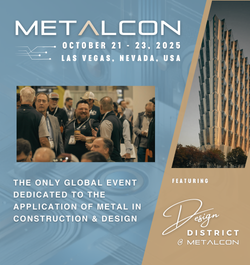

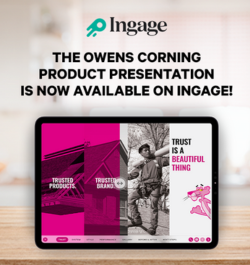
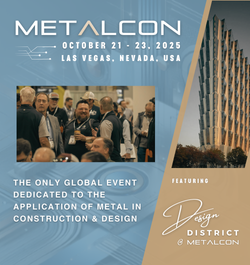
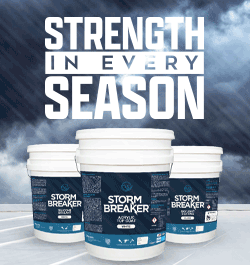







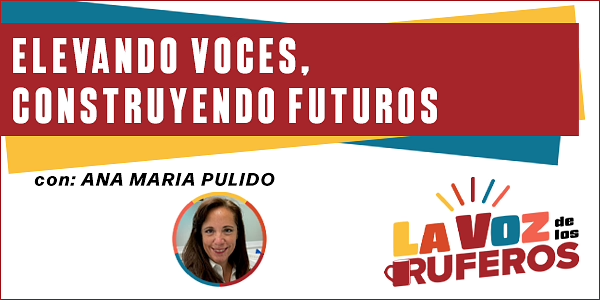
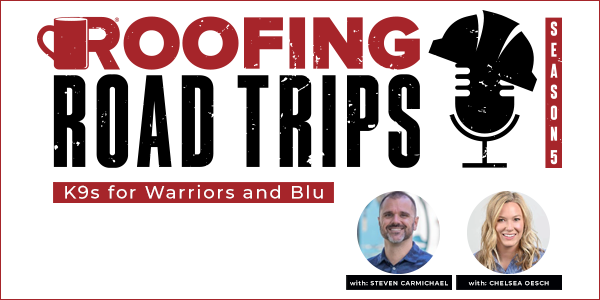


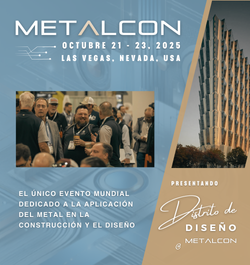



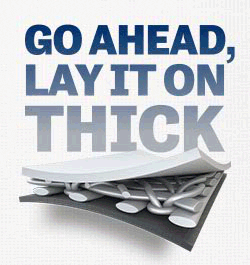

Comments
Leave a Reply
Have an account? Login to leave a comment!
Sign In